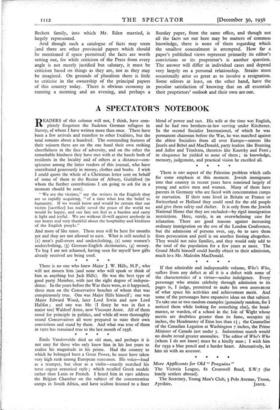A SPECTATOR'S NOTEBOOK "We are the victims," say the writers
in the English they are so rapidly acquiring, "of a time what lost the belief to humanity. If we would know and would be certain that our victim [sacrifice] has really saved the peace of the world we would be happy, and our fate not feel as a burden and carry it light and joyful. We are without ill-will against anybody in our hearts and very thankful about the hospitality and kindness of the English people."
And more of like tenor. These men will be here for months yet and they are not allowed to earn. What is still needed is (t) men's pull-overs and underclothing, (2) some women's underclothing, (3) German-English dictionaries, (4) money. To beg I am not ashamed, having seen for myself how gifts already received are being used.
* * * * There is no one who knew Major J. W. Hills, M.P., who will not mourn him (and none who will speak or think of him as anything but Jack Hills). He was the best type of good party Member, with just the right degree of indepen- dence. In the years before the War there were, as it happened, three men on the Conservative benches of whom that was conspicuously true. One was Major Hills himself; one was Major Edward Wood, later Lord Irwin and now Lord Halifax ; and one was Mr. (I fancy he was in fact a major too) Waldorf Astor, now Viscount Astor. All of them stood for principle in politics, and while all were thoroughly sound Conservatives all were prepared to state their own convictions and stand by them. And what was true of them in 1910 has remained true to the last month of 1938.
* * * * Emile Vandervelde died an old man, and perhaps it is not easy for those who only knew him in his last years to realise his magnitude in his prime. Had the country to which he belonged been a Great Power, he must have taken very high rank among European statesmen. His voice—loud as a trumpet, but clear as a violin—exactly matched his terse cogent oratorical style ; which recalled Greek models rather than Latin or French. I heard him in 19ot address the Belgian Chamber on the subject of the concentration camps in South Africa, and have seldom listened to a finer blend of power and tact. His wife at the time was English, and he had two brothers-in-law serving under Kitchener. In the second Socialist International, of which he was permanent chairman before the War, he was matched against the ablest Socialists from all over Europe—orators like Jaurs and Bebel and MacDonald, party leaders like Branting and Adler and Troelstra, theorists like Kautsky and Fern; in eloquence he yielded to none of them ; in knowledge, memory, judgement, and practical vision he excelled all.
* * * * There is one aspect of the Palestine problem which ealN for some emphasis at this moment. Jewish immigrants into that country in recent years have, consisted largely of young and active men and women. Many of them have parents in Germany who are faced with concentration camps or starvation. If their sons lived in Britain or France or Switzerland or Holland they could send for the old people and give them safety and shelter. It is only from the Jewish National Home that they are excluded—by rigid immigration restrictions. Here, surely, is an overwhelming case for relaxation. There are good reasons against increasing ordinary immigration on the eve of the London Conference, but the admission of persons over, say, 6o to save them from persecution and peril is on another footing altogether. They would not raise families, and they would only add to the total of the population for a few years at most. The Grand Mufti himself could hardly object to their admission, much less Mr. MaThohn MacDonald.
If that admirable and indispensable volume, Who's Who, suffers from any defect at all it is a defect with some of the characteristics of a virtue—undue indulgence. Every personage who attains celebrity through admission to its pages is, I judge, permitted to make his own assessment • of what space his activities and achievement merit. And some of the personages have expansive ideas on that subject. To take one or two random examples (genuinely random, for I noticed them while looking for something else), the head- master, or warden, of a school in the Isle of Wight whose merits are doubtless greater than its fame, occupies 9/ inches, the Headmaster of Eton less than ; the Counsellor of the Canadian Legation at Washington 7 inches, the Prime Minister of Canada just under 5. Industrious search would no doubt reveal greater anomalies. The editor of Who's Who (whom I do not know) must be a kindly man ; I wish him for 1939 a blue pencil and a harder heart. Alternatively, let him sit with an assessor.
* * * * More Applicants for Old "Penguins" The Victoria League, 81 Cromwell Road, S.W.7 (for lonely settlers abroad).
The Secretary, Young Men's Club, 3 Polo Avenue, Troon,


































 Previous page
Previous page